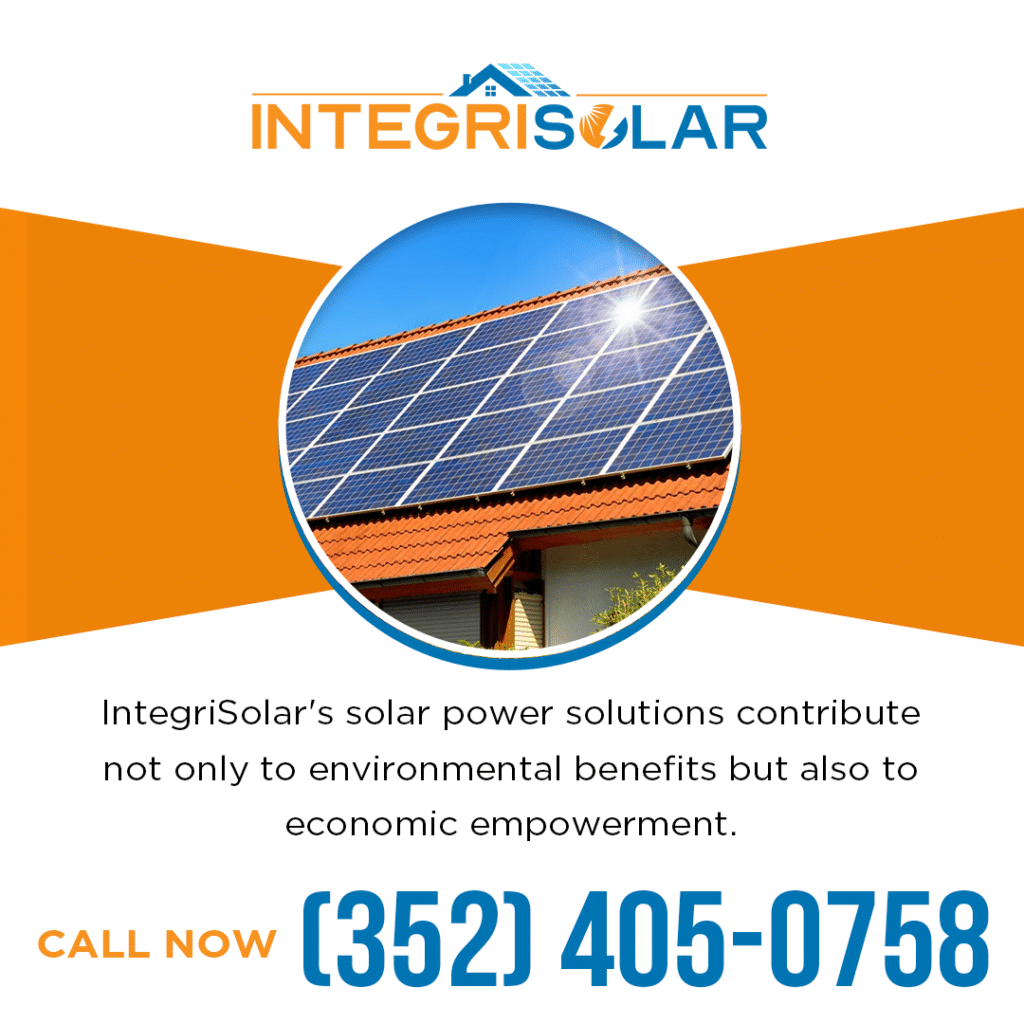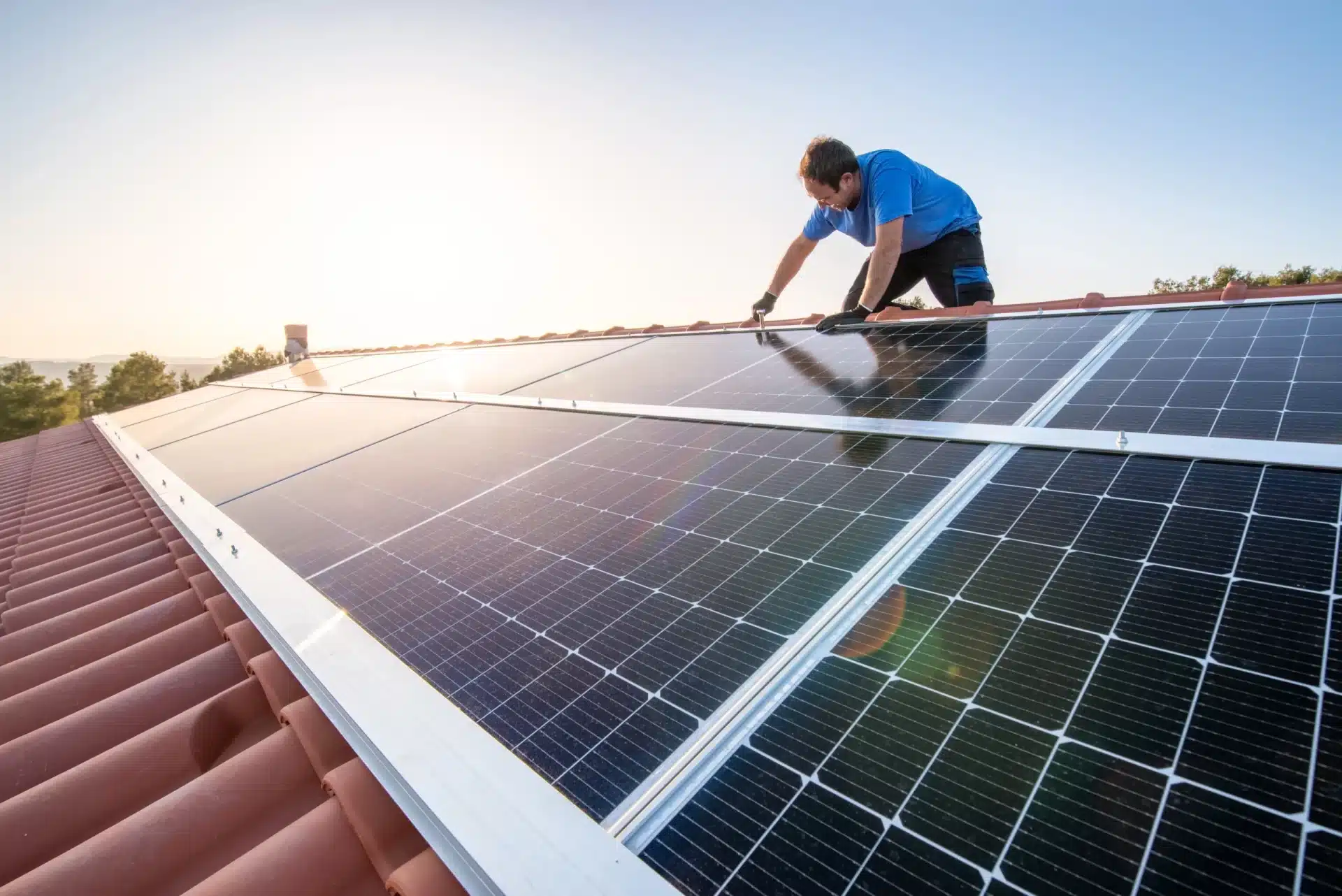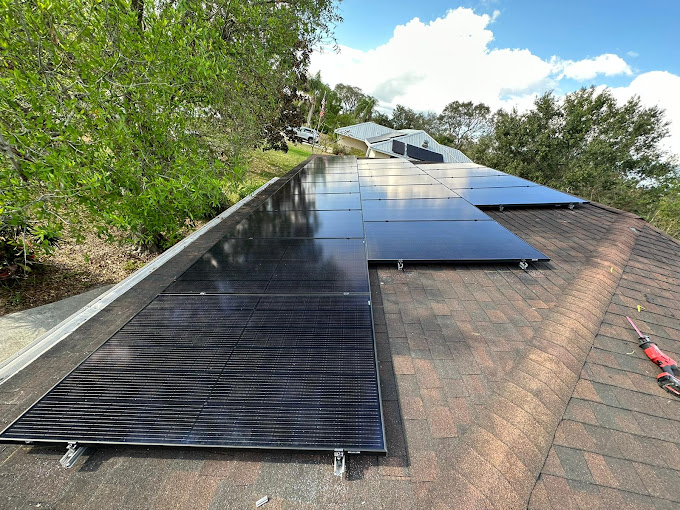As the world grapples with the urgent need to shift towards sustainable energy sources, solar power emerges as a promising solution. This article by IntegriSolar, a leading solar energy company, explores the intersection of sustainability and solar energy, highlighting its environmental benefits, renewable nature, and potential for cost savings. Solar energy represents a viable path towards a cleaner and more sustainable future by reducing dependence on fossil fuels and contributing to global sustainability efforts.
Key Takeaways
- Solar energy helps reduce greenhouse gas emissions and minimizes air and water pollution.
- It is a renewable energy source derived from the continuous supply of sunlight and reduces dependence on finite fossil fuels.
- Solar energy provides cost savings and financial incentives, such as lower energy bills, tax incentives, and increased property value.
- It contributes to global sustainability by mitigating climate change, preserving natural habitats, protecting water sources, and preventing environmental disasters.
Why is it Important to be Sustainable?
In an era marked by environmental challenges and a growing awareness of climate change, embracing sustainability has become imperative for individuals and businesses alike. One of the key pillars of sustainability is adopting renewable energy sources, with solar energy emerging as a frontrunner in pursuing cleaner and greener practices.
The importance of sustainability, particularly through using solar power, cannot be overstated. Traditional energy sources, such as fossil fuels, contribute significantly to greenhouse gas emissions, exacerbating climate change and its associated impacts. Embracing solar energy, on the other hand, offers a clean and renewable alternative. Solar power harnesses the sun’s abundant and freely available energy, producing electricity without emitting harmful pollutants or greenhouse gases. This transition to solar energy aligns with global efforts to reduce carbon footprints and mitigate the adverse effects of climate change.
IntegriSolar plays a pivotal role in this sustainability journey. As a trusted solar energy company, IntegriSolar empowers individuals and businesses to shift towards renewable energy. By installing solar panels, clients can tap into the vast potential of solar energy to meet their power needs while contributing to a more sustainable and eco-friendly energy landscape.

The benefits of embracing sustainability extend beyond environmental considerations. Adopting solar power can lead to substantial cost savings in the long run, reducing dependence on traditional energy grids and providing a reliable and consistent source of electricity. Furthermore, being sustainable enhances the reputation of individuals and businesses, reflecting a commitment to responsible and ethical practices.
The importance of sustainability, mainly through solar power, lies in its capacity to address environmental challenges, reduce carbon emissions, and pave the way for a cleaner and more sustainable future. IntegriSolar’s role as a solar power facilitator in this transition underscores the significance of making conscious choices that contribute to a healthier planet and a more resilient energy ecosystem.
Environmental Benefits
IntegriSolar recognizes the profound environmental advantages of solar energy, positioning itself as a responsible solar energy company dedicated to sustainability. Utilizing solar power diminishes greenhouse gas emissions and plays a pivotal role in curbing air and water pollution. As a clean and abundant energy source, solar power stands out for its ability to mitigate the adverse effects of conventional fossil fuels.
At IntegriSolar, we understand solar energy companies’ critical role in shaping a sustainable future. By harnessing the inexhaustible power of the sun, we actively contribute to the global effort to combat climate change. Our commitment goes beyond mere installation – we aim to be a driving force in the transition towards renewable energy, aligning with the overarching goal of building a cleaner, healthier planet.
One of the primary environmental benefits of solar energy is the significant reduction in greenhouse gas emissions. Unlike fossil fuels, solar power does not release harmful pollutants such as carbon dioxide, sulfur dioxide, or nitrogen oxide into the atmosphere. This reduction in emissions helps to minimize the greenhouse effect, which is a major contributor to global warming and climate change.
In addition to reducing greenhouse gas emissions, solar energy minimizes air and water pollution. Traditional energy sources, such as coal and natural gas, release toxic pollutants when burned. These pollutants contribute to air pollution and contaminate water sources through the deposition of harmful chemicals. On the other hand, solar power generates electricity without any combustion, thereby eliminating these harmful emissions and pollutants.
Furthermore, solar energy production requires minimal water usage compared to other forms of energy generation. Traditional power plants often rely on large amounts of water for cooling, harming local ecosystems and depleting water resources. Solar energy, a renewable resource, eliminates the need for excessive water consumption, ensuring a more sustainable use of this precious resource.
Choosing IntegriSolar as your solar energy partner means embracing a conscientious approach to energy consumption. Our expertise in harnessing solar power reduces environmental impact and aligns with your commitment to responsible energy practices. Together, we embark on a journey towards a greener future, where the benefits of solar energy are harnessed to create a sustainable and resilient energy landscape for generations to come.
Renewable Energy Source
A significant advantage of solar energy is its status as an indefinite renewable energy source. Unlike fossil fuels, which are finite and depletable, the sun provides an abundant and constant energy supply. As long as the sun shines, we can harness its energy for electricity generation and other applications. This makes solar energy a sustainable and environmentally friendly alternative to traditional energy sources.
Solar energy is renewable since it is obtained from a limitless source of sunshine. Photovoltaic (PV) panels and concentrated solar power (CSP) systems turn sunlight into energy. PV panels absorb sunlight and convert it directly into electricity, whereas CSP systems employ mirrors or lenses to focus solar energy onto a receiver, which creates heat to produce power.
The renewable nature of solar energy has several benefits. Firstly, it reduces our dependence on finite fossil fuels such as coal, oil, and natural gas. By transitioning to solar energy, we can mitigate the negative impacts of fossil fuel extraction, such as air and water pollution, habitat destruction, and greenhouse gas emissions. Moreover, solar energy decreases our carbon footprint, producing zero emissions during operation. This helps combat climate change and contributes to a cleaner and healthier environment.
An additional benefit of solar energy as a renewable resource lies in its capacity for decentralization. In contrast to centralized fossil fuel power plants, solar energy can be produced at or near the point of consumption. This characteristic allows for greater energy independence and resilience and positions solar energy companies such as IntegriSolar to play a pivotal role. Also, this capability fosters increased energy independence and resilience, empowering individuals and communities to generate clean energy and diminish dependence on the traditional grid.
Cost Savings and Financial Incentives
With the increasing affordability and various financial incentives available, the adoption of solar energy offers significant cost savings for individuals and businesses alike. Harnessing the power of the sun not only reduces reliance on traditional energy sources and provides long-term financial benefits. Here are three compelling reasons why investing in solar energy can lead to substantial cost savings:
1. Lower Energy Bills: One of the most immediate and noticeable benefits of solar energy is reducing energy bills. Homeowners and businesses can significantly offset their reliance on the grid by generating electricity from the sun. This means lower monthly bills and potential savings over the solar system’s lifetime. Additionally, excess energy generated by solar panels can be sold back to the grid, reducing energy costs.
2. Tax Incentives and Rebates: Governments at all levels recognize the value of shifting to renewable energy sources. As a result, they provide significant financial incentives to stimulate the use of solar energy. Tax credits, rebates, and grants are examples of incentives that can greatly reduce the upfront cost of installing solar panels. Individuals and corporations who take advantage of these advantages can return a significant amount of their investment in a shorter period.
3. Increased Property Value: The installation of solar panels not only yields instant cost savings but also boosts the overall value of a property. Research indicates that residences and commercial establishments equipped with solar energy systems command higher resale values. Prospective buyers are drawn to long-term energy savings and the environmental advantages of solar energy. This augmented property value serves to amplify the return on investment for solar panel installations.
4. IntegriSolar’s Financing Options: As a leading solar energy company, IntegriSolar presents a range of user-friendly financing solutions, all featuring zero down payment and zero out-of-pocket expenses. During our in-home consultation, we assist individuals in identifying the financing option that aligns best with their needs. Our preferred lenders extend rates as low as 3.99% fixed for well-qualified borrowers.
Irrespective of your credit situation, we leverage every available resource to secure the optimal financing for our services, encompassing solar panel installation, spray foam insulation, roofing, and A/C. Your journey towards sustainable energy solutions begins with seamless and tailored financial options, ensuring accessibility and affordability in your pursuit of a greener future.
Reduced Dependence on Fossil Fuels
By opting for solar energy solutions provided by IntegriSolar, individuals and businesses can actively diminish their dependence on fossil fuels. Historically, fossil fuels like coal, oil, and natural gas have been the predominant energy sources. Nevertheless, fossil fuel extraction, production, and utilization result in detrimental effects on the environment, encompassing air and water pollution, greenhouse gas emissions, and contributions to climate change.
Given these environmental challenges, mitigating reliance on fossil fuels becomes paramount in steering toward a sustainable future. As a reputable solar energy company, IntegriSolar stands ready to guide and facilitate this crucial transition, offering alternatives that reduce environmental impact and contribute to creating a cleaner and more sustainable energy landscape.
Solar energy provides a potential alternative to fossil fuels. Solar power systems collect energy from the sun and transform it into electricity or heat. Unlike fossil fuels, solar energy is a plentiful and readily accessible renewable resource. Individuals and organizations who use solar energy may minimize their carbon footprint and contribute to global efforts to combat climate change.
Moreover, solar energy provides energy independence. With solar panels installed on rooftops or vacant lands, individuals and businesses can generate electricity. This reduces their dependence on fossil fuel-based electricity supplied by utility companies. By producing their clean energy, they can save money on electricity bills and protect themselves from rising fuel prices.

Switching to solar energy also reduces the need for fossil fuel extraction and transportation. The extraction of fossil fuels often involves destructive practices, such as mountaintop removal, fracking, and deep-sea drilling. These activities harm ecosystems and pose risks to human health and safety. By embracing solar energy, individuals and businesses can help preserve natural habitats, protect water sources, and prevent environmental disasters.
Contributions to Global Sustainability
Solar energy significantly contributes to global sustainability through its renewable and environmentally friendly nature. Solar energy emerges as a viable and sustainable solution as the world faces the challenges of climate change and the depletion of natural resources. Here are three key contributions that solar energy offers in promoting global sustainability:
1. Reduction in greenhouse gas emissions: Solar energy is a clean and renewable source of power that produces zero emissions during operation. By harnessing the sun’s power, solar panels generate electricity without burning fossil fuels, thus reducing the release of greenhouse gases into the atmosphere. Reducing emissions is crucial in mitigating climate change and improving air quality.
2. Conservation of natural resources: Unlike fossil fuels, which are finite and non-renewable, solar energy relies on an abundant and inexhaustible resource: the sun. By tapping into this virtually limitless energy source, solar power helps preserve valuable natural resources such as coal, oil, and natural gas. This conservation contributes to the long-term sustainability of our planet and reduces the environmental impact associated with resource extraction.
3. Promotion of energy independence: Solar energy, championed by IntegriSolar, empowers individuals and communities to achieve self-sufficiency in meeting their energy needs. Individuals can independently generate electricity by installing solar panels on rooftops or solar farms, thereby decreasing reliance on conventional energy providers. This decentralized approach to power generation ensures energy security, cultivates economic resilience and actively empowers communities to shape their energy future. IntegriSolar is at the forefront of facilitating this transformative journey towards energy independence and sustainability, offering solutions that directly place control and autonomy over energy resources into those who harness the sun’s power.
Frequently Asked Questions
How does solar energy impact the local ecosystem and biodiversity?
The adoption of solar energy, championed by IntegriSolar, exerts a noteworthy positive influence on the local ecosystem and biodiversity. By transitioning away from fossil fuels and mitigating greenhouse gas emissions, solar energy enhances air quality and reduces pollution. Moreover, in contrast to traditional sources, solar energy systems demand less water for operation, alleviating the strain on local water resources. Nonetheless, it is imperative to carefully approach installing and managing solar panels, as improper practices can disrupt habitats, influence wildlife behavior, and pose risks to local biodiversity. IntegriSolar emphasizes implementing sustainable practices and the execution of comprehensive environmental assessments to minimize potential negative impacts, ensuring that the adoption of solar energy aligns harmoniously with ecological preservation and biodiversity conservation efforts.
What are the potential drawbacks or challenges of implementing solar energy on a large scale?
Implementing solar energy on a large scale, while offering numerous benefits, brings forth several potential drawbacks and challenges. A significant hurdle is the initial cost of installing solar panels and infrastructure. Additionally, the intermittent nature of solar power poses a challenge, given its inconsistency during cloudy or nighttime conditions. The requirement for expansive land areas for solar farms can present difficulties, potentially necessitating the displacement of natural habitats or agricultural land. Lastly, the disposal of solar panels after their lifespan raises concerns surrounding proper recycling practices and the potential environmental impact. Addressing these challenges is crucial for the sustainable advancement of solar energy. IntegriSolar stays up-to-date with the latest technological developments in the field of solar energy and is committed to navigating these complexities with strategic solutions, ensuring solar technologies’ responsible and conscientious deployment.
How does solar energy production and installation contribute to job creation?
Producing and installing solar energy, spearheaded by IntegriSolar in Ocala, FL, is pivotal in fostering job creation. This sector offers diverse employment opportunities spanning various solar energy value chain stages, encompassing manufacturing, installation, maintenance, and sales. The expansive growth of the solar energy industry has resulted in the establishment of numerous jobs catering to a spectrum of skills. It has become a driving force in economic development, effectively lowering unemployment rates. Moreover, the escalating demand for solar energy has stimulated a parallel need for research and development, further amplifying job opportunities within the renewable energy sector. IntegriSolar is dedicated to popularizing solar technologies and contributing to the broader socioeconomic landscape by facilitating employment and fostering innovation within the renewable energy domain.
Are there any potential health risks associated with solar energy usage?
IntegriSolar prioritizes safety and emphasizes that any associated risks can be significantly minimized with proper precautions. Some of these concerns include exposure to ultraviolet (UV) radiation. Additionally, there is a potential for electrical shock during the installation or maintenance of solar panels. IntegriSolar, a leading solar energy company, underscores the importance of adhering to safety measures, including using protective equipment, following installation guidelines meticulously, and conducting regular maintenance checks. By fostering awareness and implementing necessary precautions, IntegriSolar ensures that individuals and companies can harness the benefits of solar energy safely, promoting a positive and secure experience in the transition to clean, sustainable power sources.
How does solar energy storage and battery technology work, and what are the limitations of current storage solutions?
IntegriSolar, as a pioneering solar energy company, recognizes the significance of solar energy storage and battery technology in enhancing the utilization of clean energy. This innovative method involves storing surplus energy generated by solar panels for later use, encompassing the conversion of solar energy into electrical energy stored in batteries. While existing storage solutions face limited capacity, elevated costs, and regular maintenance requirements, IntegriSolar remains committed to addressing these limitations. Ongoing research and development initiatives in the solar energy world strive to improve the efficiency and affordability of storage solutions, aiming to overcome barriers and promote the widespread adoption and scalability of advanced solar energy systems. IntegriSolar’s dedication to staying up-to-date with technological advancements ensures that clients benefit from modern solutions that harness the sun’s power and address the evolving needs and challenges of the renewable energy landscape.
Conclusion
In summary, IntegriSolar affirms that solar energy is a dependable renewable source with many environmental advantages. Beyond the tangible benefits of cost savings and financial incentives, it significantly diminishes reliance on fossil fuels. More importantly, solar energy contributes to global sustainability, fostering a cleaner and greener future. With a steadfast commitment to harnessing the sun’s power, IntegriSolar envisions a world characterized by sustainability and environmental friendliness, ensuring a legacy of responsible energy consumption for future generations.






